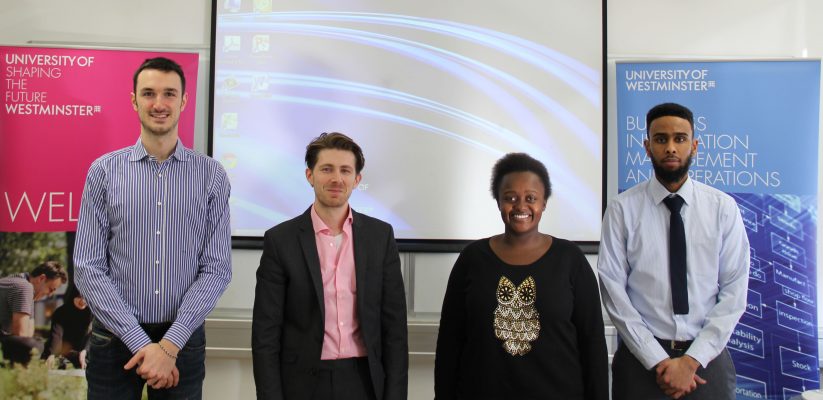On Friday 6 February 2015 Westminster Business School hosted a presentation session for representatives from Royal Mail following a project conducted by students from Purchasing and Supply Chain Management MSc.
Students were set the problem of increasing the efficiency of cross-docking procedures at Royal Mail’s Princess Royal Distribution Centre (PRDC); when quizzed as to why Royal Mail chose to work with our MSc students, Roger Hassan, Plant Manager at the Royal Mail National Distribution centre, said that he wanted to exploit the naivety of approach and specific subject knowledge of Westminster Business School’s PSCM students. Students worked closely with Maureen Wankiju, then Logistics Pillar Lead at the PRDC and now Network Optimisation Manager. MSc student Soleman Hashi stated that he found ‘collaboration on the project helpful’ and that ‘conversations brought up additional considerations’ which lead to the ‘achievement of worthwhile objectives’ for all involved. This collaboration served as the Project Dissertation constituent of the students’ MSc programme. Soleman’s project resulted in proposals with potential to achieve significant cost savings. He found the experience thoroughly enjoyable and particularly valued the professionalism of staff at the Logistics Pillar Team of Royal Mail. Soleman is keen for collaboration to continue for the benefit of other students “I wouldn’t hesitate to recommend this research project format to other students”.
Cross docking is the process of consolidating outgoing shipments, which in the case of Royal Mail pertains to postal goods. The PSCM students took a number of visits to Royal Mail’s PRDC in order to help understand the context of their problem, an experience that they found particularly helpful. Whilst the students were modest about their level of experience in this particular area, Mr Hassan from RM highlighted how the cross-docking issue was more a matter of ‘flow’, something that Purchasing and Supply Chain Management students are very familiar with, and therefore this collaboration tapped into students theoretical knowledge of the situation more than their real-world experience. Niccolo Berti, another student who participated in the project, described how the ‘positive outcome’ of the project was achieved through ‘comparing ideas with other students’ and ‘gaining practical experience and an internal point of view’ with Royal Mail. Niccolo was also thankful for Royal Mail’s support throughout the project, which he describes as ‘a fantastic experience.’ Students presented their findings from the project to Mr Hassan and Maureen Wankiju, from Royal Mail who worked closely with the PSCM MSc students throughout their project.
This project highlights the importance of collaboration both between students, and between the University and industry, and is just one example of the opportunities that Westminster Business School offers to students to exploit its excellent links with industry.

